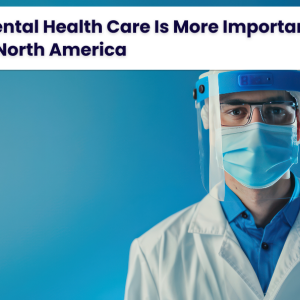
Mental Health Awareness: Why Canada & the USA Need to Act Now
Mental health awareness is an issue that has come to the forefront of global conversations, yet it still remains an area in urgent need of attention, particularly in countries like Canada and the USA. With mental health directly impacting well-being, productivity, and overall public health, we need to ensure it is prioritized. In this blog, we will explore why mental health awareness should be a top priority in both Canada and the USA, and how prioritizing this critical issue can foster healthier, happier communities.
The Growing Prevalence of Mental Health Disorders
Mental health issues are not as rare as many people think. In fact, they affect millions of individuals every year. According to the Canadian Mental Health Association (CMHA), 1 in 5 Canadians will experience a mental health problem or illness each year. In the United States, the National Alliance on Mental Illness (NAMI) reports that nearly 20% of American adults are affected by mental illness annually.
This startling prevalence underscores the need for comprehensive mental health education and intervention strategies. Conditions such as depression, anxiety, and post-traumatic stress disorder (PTSD) are just a few examples of the many mental health issues that can prevent people from living fulfilling and productive lives. The more we talk about mental health, the better equipped we become to identify problems early on and support those in need.
The Connection Between Mental and Physical Health
Mental health is deeply interconnected with physical health. When someone is struggling with depression or anxiety, they may experience physical symptoms like chronic pain, fatigue, and difficulty sleeping. For those dealing with chronic physical illnesses, mental health struggles like depression and anxiety are common as well. In fact, in Canada, individuals with chronic conditions like heart disease, diabetes, and cancer often experience higher rates of mental health issues, such as anxiety and depression.
Similarly, in the USA, nearly one in four individuals battling cancer report symptoms of depression, making it harder to cope with treatment and recovery. By raising awareness around this connection, we can ensure that healthcare providers address both mental and physical health simultaneously, creating a more holistic and supportive healthcare system for everyone.
Breaking the Stigma
Despite progress, the stigma surrounding mental health continues to prevent many people from seeking the help they need. In both Canada and the USA, mental health issues still carry a degree of shame and embarrassment, making individuals hesitant to discuss their struggles. The fear of being judged or misunderstood often leads to prolonged suffering, and in some cases, devastating consequences like suicide.
It’s crucial that we challenge this stigma. By creating an open dialogue around mental health—whether in the workplace, in schools, or within families—we can help people feel comfortable and confident in seeking help when they need it most. Mental health education plays a vital role in breaking down these barriers and showing that asking for help is a sign of strength, not weakness.
Improving Access to Mental Health Care
One of the biggest challenges both countries face is ensuring everyone has access to quality mental health care. In Canada, while universal healthcare provides coverage for many services, mental health care often comes with long wait times and limited access to specialized providers. In the USA, the situation can be even more difficult, with many people unable to afford the mental health treatment they need due to gaps in insurance coverage.
The need for accessible mental health care is growing more urgent every day. Expanding telehealth services, increasing funding for mental health programs, and integrating mental health services into primary care are essential steps in addressing these barriers. Both Canada and the USA must prioritize mental health in their healthcare policies to ensure that people don’t have to wait for months to receive the care they need.
The Economic Impact of Untreated Mental Illness
The economic cost of untreated mental illness is staggering. In the USA, mental illness costs the economy an estimated $193.2 billion in lost productivity every year. In Canada, the financial burden is equally severe, with the Mental Health Commission of Canada estimating that mental health issues cost the country more than $50 billion annually in healthcare expenses and lost productivity.
The economic toll of untreated mental health problems highlights the importance of early intervention and treatment. By addressing mental health issues proactively, both countries can reduce the financial burden on the healthcare system, boost productivity, and create a healthier, more resilient workforce.
Mental Health and Vulnerable Populations
Certain groups in both Canada and the USA are disproportionately affected by mental health issues. Indigenous communities, immigrants, refugees, and LGBTQ+ individuals often face unique challenges, including discrimination, trauma, and cultural barriers to accessing care. These populations experience higher rates of mental health struggles, and the need for targeted support is greater than ever.
For example, Indigenous communities in Canada and the USA are at higher risk for depression, suicide, and substance abuse. Similarly, LGBTQ+ individuals experience higher rates of anxiety, depression, and suicide due to societal stigma and discrimination. By tailoring mental health awareness campaigns to meet the needs of these vulnerable populations, we can ensure that mental health care is accessible and culturally competent for everyone.
Did You Know?
- 1 in 5 people face mental illness each year – In Canada and the USA, nearly 20% of adults experience mental health issues annually.
- Mental illness costs billions – Mental health issues cost Canada over $50 billion and the USA $193.2 billion each year in lost productivity and healthcare costs.
- Mental health impacts physical health – Conditions like depression and anxiety are linked to chronic illnesses such as heart disease and diabetes.
- Stigma prevents treatment – Over 60% of people with mental health issues never seek help due to fear of judgment.
The Role of Schools and Workplaces
Schools and workplaces are key environments for promoting mental health awareness. In both Canada and the USA, schools are beginning to incorporate mental health education into their curriculums, teaching children and adolescents the importance of mental well-being. Early intervention in schools can help students develop the coping skills they need and encourage them to seek help before their issues become more serious.
Workplaces, too, play a critical role. Employers who prioritize mental health create healthier and more productive work environments. Offering mental health days, counseling services, and fostering a supportive company culture can significantly improve the mental well-being of employees. Companies that invest in their employees’ mental health are more likely to see lower absenteeism, increased productivity, and improved morale.
COVID-19 and the Need for Mental Health Awareness
The COVID-19 pandemic has only intensified the need for mental health awareness. Both Canada and the USA saw a sharp rise in mental health issues during the pandemic, with increased rates of anxiety, depression, and substance abuse. The lingering effects of grief, isolation, and uncertainty continue to impact individuals’ mental health, and it’s clear that the recovery process will take years.
As we work toward healing from the pandemic, mental health must remain a priority in both countries’ public health strategies. Supporting community-based mental health initiatives, expanding mental health services, and continuing to raise awareness about mental health will be key in ensuring that people have the support they need to recover.
Summary
Mental health awareness is not just about supporting individuals—it’s about creating healthier, more resilient societies. By addressing the growing prevalence of mental health issues, breaking down stigma, improving access to care, and supporting vulnerable populations, we can build stronger communities in Canada and the USA. Prioritizing mental health awareness will not only improve well-being but will also contribute to a more productive and prosperous society for everyone.





